Poco入门介绍
PetaPoco入门
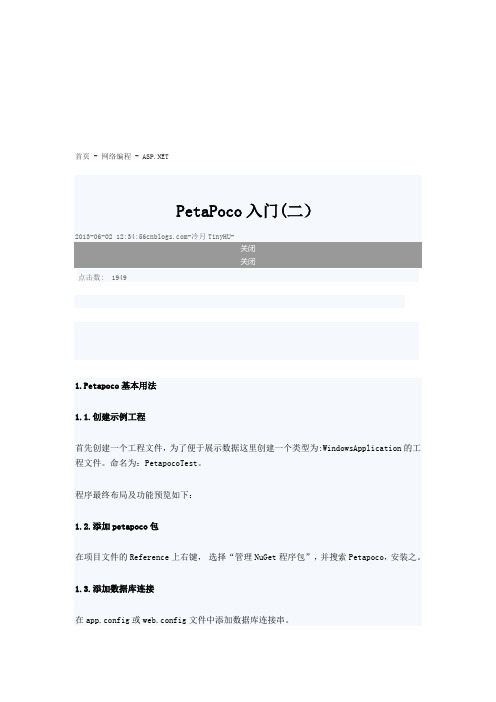
首页 - 网络编程 - PetaPoco入门(二)2013-06-02 12:34:-冷月TinyHU-点击数: 19491.Petapoco基本用法1.1.创建示例工程首先创建一个工程文件,为了便于展示数据这里创建一个类型为:WindowsApplication的工程文件。
命名为:PetapocoTest。
程序最终布局及功能预览如下:1.2.添加petapoco包在项目文件的Reference上右键,选择“管理NuGet程序包”,并搜索Petapoco,安装之。
1.3.添加数据库连接在app.config或web.config文件中添加数据库连接串。
下面是连接SQL Server:<connectionStrings> <add name="DefaultConnection" connectionString="Data Source=huhm/sqlexpress;Initial Catalog=Northwind;Persist Security Info=True;User ID=aspnet;Password=***;" providerName="System.Data.SqlClient" /> </connectionStrings>下面是连接MySQL:<add name="DefaultConnection" connectionString="Server=huhm;Port=3306;Database=Northwind;Uid=aspnet;Pwd=***;p ooling=false;" providerName="MySql.Data.MySqlClient"/>由于petapoco是与面向数据库无关的ORM组件,故对DB的增、删、改、查的代码与具体连接哪个物理数据库类型无关。
钢琴入门:钢琴谱术语大全知识讲解

钢琴入门:钢琴谱术语大全钢琴入门:钢琴谱术语大全读谱贯穿着钢琴学习的整个过程,是学好钢琴的重要一环。
只有学会了怎么读谱,清楚地正确清楚地读出钢琴谱中所标注的调号、谱号、节奏、音乐术语等等,才能更好地理解乐曲,将其诠释得更加完美。
古诺钢琴整理出一些钢琴谱术语大全,希望大家在钢琴学习中能事半功倍。
一、钢琴谱表情术语表情术语是指明乐曲在演唱、演奏时表情要求的文字标记。
表情术语的作用主要为帮助演奏更好、更快地理解和表达音乐作品的感情。
表情术语中文意思a tempo 原速Allegretto 小快板Allegro 快板Allegro con brio 快板、热烈地Allegro marziable 快板、威武地Allegro moderato 中庸的快板Allegro molto agitato 非常激烈动的快板Allegro non troppo 不太快的快板Allegro scherzando 快板、诙谐地Allegro vivace 活泼的快板Allegro vivo 充满活力的快板Andantino quasi Allegretto 小行板(近似小快板)Animato 有生气地、活泼地cresc.assai 十分渐强deciso 肯定地、果断地delicate 纤细地dolce cantabile 柔和如歌dolce lusingando 柔和亲切地dolente 悲伤地D . C . al Fine(Da capo al Fine)从头再奏一次,到fine结束espressivo 有表情地grazioso 优雅地in tempo 原速m.g(main gauche)用左手弹m.d(main droit)用右手弹misterioso 神秘地Moderato 中速Molto agitato, quasi presto 很迫切、近似急板Molto legato e leggiero 非常连贯、轻快mormoando 喃喃细语地Movement de Valse 圆舞曲速度perdendosi 渐渐消失ped. simile 同样的踏板piu lento 再慢地presto 急板Rall (rallentando)减慢religioso 宗教般虔诚、庄严地risoluto 果断地Riten(ritenuto)渐慢subito 突然、立刻sempre con ped 继续用踏板senza ped 不用踏板ten.(tenuto)保持充分时值un poco agitato 稍激动地allamarcia 进行曲风格allargando 渐慢并渐强appassionate 热情地agitato 激动地animato 生气勃勃地brillante 辉煌地brioso 充满活力地comodo 自在地con fuoco 火热地calm 平静地cantabile 如歌地con spirito 有精神地deciso 坚定地doice 柔和地dolente 怨诉地energico 精力充沛地fantastico 幻想地grave 沉重地grazioso 优雅地giocoso 嬉戏地leggiero 轻巧地largamente 宽广地maestoso 庄严地marcato 强调mesto 忧伤地nobilmente 高雅地pathetic 悲怆地passionate 热情洋溢地pastoral 田园地risoluto 果断地Rubato 节奏自由semplice 朴素地sempre 继续地sentimento 多愁善感地sostenuto 持续地vivace 活泼地vivo 活跃地scherzando 幽默地spirito 精神饱满地tranquillo 安静地二、钢琴谱速度术语音乐进行的快慢称为速度,速度记号用来标明乐曲在进行中快慢。
POCO C++库学习和分析 -- 异常、错误处理、调试
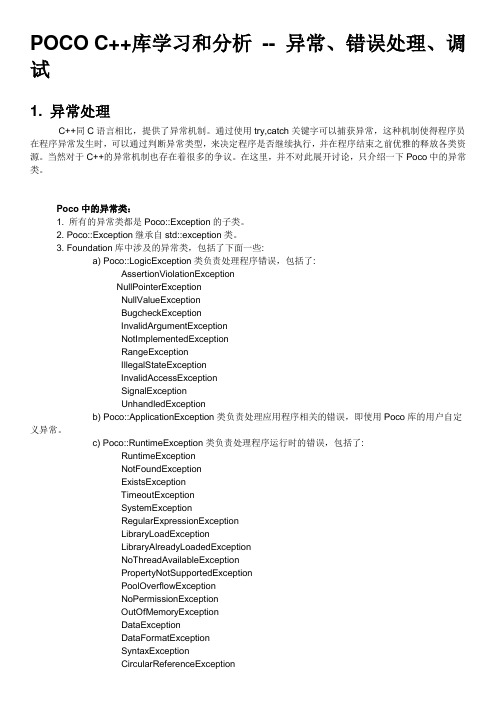
POCO C++库学习和分析-- 异常、错误处理、调试1. 异常处理C++同C语言相比,提供了异常机制。
通过使用try,catch关键字可以捕获异常,这种机制使得程序员在程序异常发生时,可以通过判断异常类型,来决定程序是否继续执行,并在程序结束之前优雅的释放各类资源。
当然对于C++的异常机制也存在着很多的争议。
在这里,并不对此展开讨论,只介绍一下Poco中的异常类。
Poco中的异常类:1. 所有的异常类都是Poco::Exception的子类。
2. Poco::Exception继承自std::exception类。
3. Foundation库中涉及的异常类,包括了下面一些:a) Poco::LogicException类负责处理程序错误,包括了:AssertionViolationExceptionNullPointerExceptionNullValueExceptionBugcheckExceptionInvalidArgumentExceptionNotImplementedExceptionRangeExceptionIllegalStateExceptionInvalidAccessExceptionSignalExceptionUnhandledExceptionb) Poco::ApplicationException类负责处理应用程序相关的错误,即使用Poco库的用户自定义异常。
c) Poco::RuntimeException类负责处理程序运行时的错误,包括了:RuntimeExceptionNotFoundExceptionExistsExceptionTimeoutExceptionSystemExceptionRegularExpressionExceptionLibraryLoadExceptionLibraryAlreadyLoadedExceptionNoThreadAvailableExceptionPropertyNotSupportedExceptionPoolOverflowExceptionNoPermissionExceptionOutOfMemoryExceptionDataExceptionDataFormatExceptionSyntaxExceptionCircularReferenceExceptionPathSyntaxExceptionIOExceptionProtocolExceptionFileExceptionFileExistsExceptionFileNotFoundExceptionPathNotFoundExceptionFileReadOnlyExceptionFileAccessDeniedExceptionCreateFileExceptionOpenFileExceptionWriteFileExceptionReadFileExceptionUnknownURISchemeException成员函数及数据定义:1. Poco::Exception包括了一个名字,这是一个静态的字符串,用来描述异常本身。
钢琴入门:钢琴谱术语大全

钢琴入门:钢琴谱术语大全读谱贯穿着钢琴学习的整个过程,就是学好钢琴的重要一环。
只有学会了怎么读谱,清楚地正确清楚地读出钢琴谱中所标注的调号、谱号、节奏、音乐术语等等,才能更好地理解乐曲,将其诠释得更加完美。
古诺钢琴整理出一些钢琴谱术语大全,希望大家在钢琴学习中能事半功倍。
一、钢琴谱表情术语表情术语就是指明乐曲在演唱、演奏时表情要求的文字标记。
表情术语的作用主要为帮助演奏更好、更快地理解与表达音乐作品的感情。
表情术语中文意思a tempo 原速Allegretto 小快板Allegro 快板Allegro con brio 快板、热烈地Allegro marziable 快板、威武地Allegro moderato 中庸的快板Allegro molto agitato 非常激烈动的快板Allegro non troppo 不太快的快板Allegro scherzando 快板、诙谐地Allegro vivace 活泼的快板Allegro vivo 充满活力的快板Andantino quasi Allegretto 小行板(近似小快板)Animato 有生气地、活泼地cresc、assai 十分渐强deciso 肯定地、果断地delicate 纤细地dolce cantabile 柔与如歌dolce lusingando 柔与亲切地dolente 悲伤地D 、C 、al Fine(Da capo al Fine)从头再奏一次,到fine结束espressivo 有表情地grazioso 优雅地in tempo 原速m.g(main gauche) 用左手弹m.d(main droit) 用右手弹misterioso 神秘地Moderato 中速Molto agitato, quasi presto 很迫切、近似急板Molto legato e leggiero 非常连贯、轻快mormoando 喃喃细语地Movement de Valse 圆舞曲速度perdendosi 渐渐消失ped、simile 同样的踏板piu lento 再慢地presto 急板Rall (rallentando) 减慢religioso 宗教般虔诚、庄严地risoluto 果断地Riten(ritenuto) 渐慢subito 突然、立刻sempre con ped 继续用踏板senza ped 不用踏板ten、(tenuto) 保持充分时值un poco agitato 稍激动地allamarcia 进行曲风格allargando 渐慢并渐强appassionate 热情地agitato 激动地animato 生气勃勃地brillante 辉煌地brioso 充满活力地con fuoco 火热地calm 平静地cantabile 如歌地con spirito 有精神地deciso 坚定地doice 柔与地dolente 怨诉地energico 精力充沛地fantastico 幻想地grave 沉重地grazioso 优雅地giocoso 嬉戏地leggiero 轻巧地largamente 宽广地maestoso 庄严地marcato 强调mesto 忧伤地nobilmente 高雅地pathetic 悲怆地passionate 热情洋溢地pastoral 田园地risoluto 果断地Rubato 节奏自由semplice 朴素地sempre 继续地sentimento 多愁善感地sostenuto 持续地vivace 活泼地vivo 活跃地spirito 精神饱满地tranquillo 安静地二、钢琴谱速度术语音乐进行的快慢称为速度,速度记号用来标明乐曲在进行中快慢。
Poco入门介绍
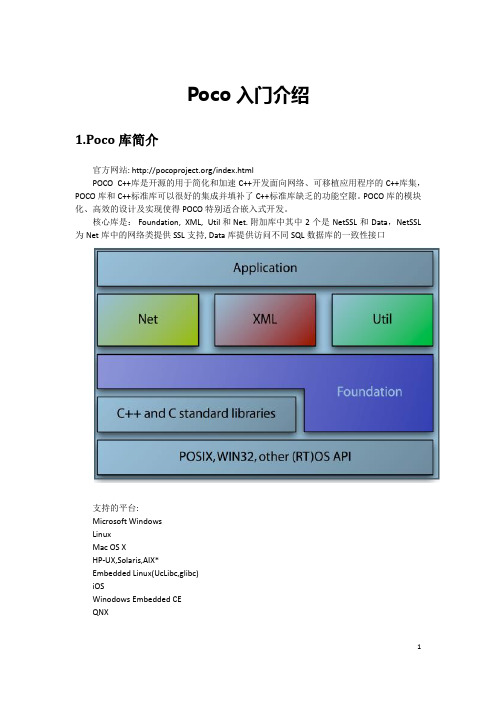
Poco入门介绍1.Poco库简介官方网站: /index.htmlPOCO C++库是开源的用于简化和加速C++开发面向网络、可移植应用程序的C++库集,POCO库和C++标准库可以很好的集成并填补了C++标准库缺乏的功能空隙。
POCO库的模块化、高效的设计及实现使得POCO特别适合嵌入式开发。
核心库是: Foundation, XML, Util 和 Net. 附加库中其中2个是NetSSL和Data,NetSSL 为Net库中的网络类提供SSL支持, Data库提供访问不同SQL数据库的一致性接口支持的平台:Microsoft WindowsLinuxMac OS XHP-UX,Solaris,AIX*Embedded Linux(UcLibc,glibc)iOSWinodows Embedded CEQNX2.常用功能点> Any and DynamicAny classes> Cache framework> Cryptography (cryptographic hashes, encryption based on OpenSSL)> Date and Time classes> Events (signal/slot mechanism) and notifications framework> FTP client for transferring files> Filesystem classes for platform-independent path manipulation,directory listing and globing > HTML form handling> HTTP server and client (also secure), C++ Server Page Compiler> Logging framework> Multithreading: basic threads and synchronization and advanced facilities (thread pool, active objects, work queues, etc.)> POP3 client for receiving mail> Platform Abstraction: write once, compile and run on multiple platforms> Processes and IPC> Reactor framework> Regular expressions (based on PCRE)> SMTP client for sending mail> SQL database access (SQLite, MySQL, ODBC)> SSL/TLS support based on OpenSSL> Shared library and class loading>Smart pointers and memory management (buffer, pool)> Sockets and raw sockets> Stream classes for Base64 and HexBinary encoding/decoding, compression (zlib), line ending conversion, reading/writing tomemory, etc> String formatting and string utilities> TCP server framework (multithreaded)> Text encodings and conversions> Tuples> URI handling> UTF-8 and Unicode support> UUID handling and generation> XML parsing (SAX2 and DOM) and XML generation> Zip file manipulation2.编译安装2.1 windows下的编译安装2.1.1 Visual Studio 2008 下的编译安装---省略演示2.1.2 Eclipse 下的编译安装---演示为主1.安装MinGW+msys cygwin2.安装eclipse3.设置eclipse编译工具链2.2 unix/linux平台下的编译安装主要步骤如下:1.2.3.HelloWorld 开发自己的第一个应用3.1构建自己的工程a.创建工程目录hellWorldb.创建目录include src 目录helloWorld/include/srcMakefilec. 创建hellWorld.cpp文件3.2编写Makefile警告:Objects,target,target_version,target_libs变量最末尾一定不能有空格,否则编译会出现异常3.3 编译Gmake shared_release3.4 运行3.5 调试4.核心模块介绍4.1.跨平台编译包编译脚本目录$POCO_BASE/build常见的修改:POCO_BASE 定义poco代码目录OSARCH_64BITS =1 定义64位编译模式SRCDIR = src makefile与.cpp的位置INCDIR = include .h文件夹LIBDIR = lib lib文件夹BINDIR = bin bin文件夹OBJDIR = obj/$(OSNAME)/$(OSARCH)DEPDIR = .dep/$(OSNAME)/$(OSARCH)LIBPATH = $(POCO_BUILD)/$(LIBDIR)BINPATH = $(POCO_BUILD)/$(COMPONENT)/$(BINDIR) -->建议改为$(BINDIR)OBJPATH = $(POCO_BUILD)/$(COMPONENT)/$(OBJDIR)-->可以不用管)$(OBJDIR)DEPPATH = $(POCO_BUILD)/$(COMPONENT)/$(DEPDIR)-->依赖文件目录)$(DEPDIR)系统自带的编译指令:all: $(DEFAULT_TARGET)all_static: static_debug static_releaseall_shared: shared_debug shared_releaseall_debug: static_debug shared_debugall_release: static_release shared_release自定义编译指令:CFLAGS += -gCXXFLAGS += -gPOCO_FLAGS +=COMMONFLAGS = -DPOCO_BUILD_HOST=$(HOSTNAME) $(POCO_FLAGS)添加额外的头文件路径:POCO_ADD_INCLUDE += $(ORACLE_HOME)/precomp/public $(ORACLE_HOME)/rdbms/public $(ORACLE_HOME)/rdbms/demoPOCO_ADD_LIBRARY +=$(ORACLE_HOME)/$(OraLib)添加额外的链接库非POCO编译出来的库SYSLIBS +=-locci -lclntsh编译方式:gmake shared_releasegmake shared_debuggmake static_releasegmake static_debuggmake all_releasegmake all_debuggmake all4.2.Foundation库4.2.1 core 模块a.Platform abstraction1.统一了各个平台的数据类型比如long ,int ,long long 等,参考types.h2.平台的big-endian和little-endian 参考ByteOrder.h3.平台类型相关信息platform.hb. Memory Management1.智能指针(smart pointer)和共享指针(shared pointer) 参考AutoPtr.h,SharedPtr.h2.据以引用计数器的垃圾回收机制AtomicCounter.h,refCountedObject.h3.单件类(singleton objects) SingletonHolder.hc.String Utilities字符串的比较(大小写转换,大小写无关转换,去除空白符号,字符转换和连接,分拆),参考String.h,StringTokenizer.hd.Error Handling1. 断言类,类似assert,主要使用宏断言,比如poco_asert(myPtr);参考Bugcheck.h2.异常类, 了解Poco::exception结构,使用POCO_DECLARE_EXCEPTION宏,参考Exception.h4.2.2.streamspass4.2.3.Threadingpass4.2.4.DateTimea.Timestamp 微秒级精度,对gettimeofday()封装,参考Timestamp.hb.Stopwatch 计时器,参考Stopwatch.hc.DateTime 日历时间,参考DateTime.hd.日历时间的格式转换DateTimeFormat,DateTimeFormatter,DateTimeParser 等e.日历时区Timezonef.本地时间LocalDateTime4.2.5 FileSystem与平台无关的文件,目录的操作类。
小米产品及品牌分析

小米产品及品牌分析1. 引言小米科技有限责任公司(以下简称“小米”)是一家总部位于中国的科技公司,致力于研发和销售智能手机、智能家居设备和其他消费电子产品。
本文将对小米的产品和品牌进行分析,包括产品组合、市场定位、品牌形象等方面。
2. 产品组合小米的产品组合涵盖了多个领域,主要包括智能手机、智能家居设备和生态链产品。
2.1 智能手机小米的智能手机系列包括Mi、Redmi和POCO。
Mi系列旗舰手机注重性能和创新,Redmi系列则注重性价比,POCO系列则专注于提供高性能的入门级手机。
每一个系列都有多个型号,以满足不同消费者的需求。
2.2 智能家居设备小米的智能家居设备包括智能音箱、智能摄像头、智能插座、智能灯泡等。
这些设备通过小米的智能家居平台连接,可以通过手机APP进行控制和管理。
2.3 生态链产品小米还通过投资和合作火伴关系开辟了一系列生态链产品,包括电视、电脑、电动滑板车、智能手表等。
这些产品与小米的品牌形象相符,提供了全面的智能化解决方案。
3. 市场定位小米在市场上的定位是提供高性价比的产品,以满足泛博消费者的需求。
通过控制成本和提高效率,小米能够在同类产品中提供更具竞争力的价格。
同时,小米也注重产品的创新和技术的引领,以增加产品的附加值和竞争力。
3.1 价格定位小米的产品价格相对较低,特别是在智能手机领域。
小米通过优化供应链和生产流程,降低成本,从而能够以更低的价格销售产品。
这使得小米的产品对于中低收入消费者来说更具吸引力。
3.2 技术创新小米在产品的技术创新方面表现出色。
例如,小米在智能手机领域推出了多项创新技术,如超声波屏下指纹识别、骁龙处理器、超大容量电池等。
这些技术的引入提升了产品的性能和用户体验,增加了产品的竞争力。
3.3 市场定位策略小米采用了线上线下结合的市场定位策略。
通过在线销售渠道,小米能够以更低的价格销售产品,并且能够更好地与用户进行互动和反馈。
同时,小米也在全球范围内开设了线下实体店,以提供更好的购物体验和售后服务。
作文范文之意大利语作文大全

作文范文之意大利语作文大全意大利语作文大全【篇一:意大利语-自我介绍】1.自我介绍mi posso presentare. 请允许我自我介绍一下。
mi chiamo tie ying 我叫李东。
prego, mi pui fare lo spelling. 请您拼写一下!mi passi a trovare. 到我这儿玩!grazie mille! 万分感谢!2.介绍别人意大利语自我介绍posso fare le presentazioni. 请允许我介绍一下。
这是谁?3.国家和语言da quale paese viene? 您来自哪个国家?veno dalla cina. 我来自中国。
da quale citta? 您来自哪个城市?da shang hai. 我来自上海。
viene al giappone? 您来自日本?1no, vengo dalla corea. 不,我来自韩国。
lei viene dalla germania? 您来自德国吗?no, vengo dall会一点点。
4家庭、年龄quanti anni ha? 您多大岁数?quanti me ne da? 您看我有多大岁数?trenta cinque. 35岁。
grazie, me ho 46. 谢谢,我46岁了。
e sposato(a)?您结婚了吗?si,sono sposato. 我结婚了。
no, sono scapolo.(nubile) 我单身。
sono separato(a). 我分居(离婚)了。
ha figli?您有孩子吗?ho una figlia.我有一个女儿。
ho un figlio.我有一个儿子。
non ho figli. 我没有孩子。
5来意大利的目的lavoro qui. 我在这儿工作。
sono studente. 我是学生。
studio i’ italiano. 我学意大利语。
ho un progetto di ricerca. 我搞一个科研项目。
钢琴入门:钢琴谱术语大全
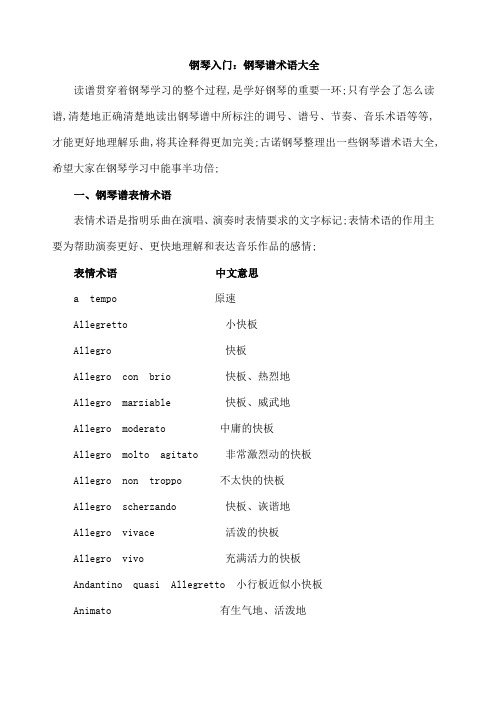
钢琴入门:钢琴谱术语大全读谱贯穿着钢琴学习的整个过程,是学好钢琴的重要一环;只有学会了怎么读谱,清楚地正确清楚地读出钢琴谱中所标注的调号、谱号、节奏、音乐术语等等,才能更好地理解乐曲,将其诠释得更加完美;古诺钢琴整理出一些钢琴谱术语大全,希望大家在钢琴学习中能事半功倍;一、钢琴谱表情术语表情术语是指明乐曲在演唱、演奏时表情要求的文字标记;表情术语的作用主要为帮助演奏更好、更快地理解和表达音乐作品的感情;表情术语中文意思a tempo 原速Allegretto 小快板Allegro 快板Allegro con brio 快板、热烈地Allegro marziable 快板、威武地Allegro moderato 中庸的快板Allegro molto agitato 非常激烈动的快板Allegro non troppo 不太快的快板Allegro scherzando 快板、诙谐地Allegro vivace 活泼的快板Allegro vivo 充满活力的快板Andantino quasi Allegretto 小行板近似小快板Animato 有生气地、活泼地十分渐强deciso 肯定地、果断地delicate 纤细地dolce cantabile 柔和如歌dolce lusingando 柔和亲切地dolente 悲伤地D . C . al FineDa capo al Fine从头再奏一次,到fine结束espressivo 有表情地grazioso 优雅地in tempo 原速m.gmain gauche 用左手弹m.dmain droit 用右手弹misterioso 神秘地Moderato 中速Molto agitato, quasi presto 很迫切、近似急板Molto legato e leggiero 非常连贯、轻快mormoando 喃喃细语地Movement de Valse 圆舞曲速度perdendosi 渐渐消失ped. simile 同样的踏板piu lento 再慢地presto 急板Rall rallentando 减慢religioso 宗教般虔诚、庄严地risoluto 果断地Ritenritenuto 渐慢subito 突然、立刻sempre con ped 继续用踏板senza ped 不用踏板ten.tenuto 保持充分时值un poco agitato 稍激动地allamarcia 进行曲风格allargando 渐慢并渐强appassionate 热情地agitato 激动地animato 生气勃勃地brillante 辉煌地brioso 充满活力地comodo 自在地con fuoco 火热地calm 平静地cantabile 如歌地con spirito 有精神地deciso 坚定地dolente 怨诉地energico 精力充沛地fantastico 幻想地grave 沉重地grazioso 优雅地giocoso 嬉戏地leggiero 轻巧地largamente 宽广地maestoso 庄严地marcato 强调mesto 忧伤地nobilmente 高雅地pathetic 悲怆地passionate 热情洋溢地pastoral 田园地risoluto 果断地Rubato 节奏自由semplice 朴素地sempre 继续地sentimento 多愁善感地sostenuto 持续地vivo 活跃地scherzando 幽默地spirito 精神饱满地tranquillo 安静地二、钢琴谱速度术语音乐进行的快慢称为速度,速度记号用来标明乐曲在进行中快慢;音乐的速度对于表现乐曲的情绪、塑造音乐形象具有重要的意义;例如,激动、欢快的情绪通常用较快的速度表现,中速则侧重于表现抒情及田园般的风格,颂歌、挽歌、葬礼曲及对往事的回忆等多用较慢的速度表现;因此,乐曲速度把握得恰当与否,对作品情绪的表达、形象的呈现显得至关重要;表情术语中文意思Adagio 柔板Andante 行板Adagio assai 很慢的柔板Andantino 小行板Allegretto non troppo 不快的小快板Allegretto 小快板Allegretto poco mosso 稍快的小快板Allegro 快板Grave 庄板Larghetto 小广板Largo 广板Lento 慢板Moderado 中板Prestissimo 最急板Presto 急板a temp 回原速in tempo 按原速accelerato 加快的accel 加快的缩写conmoto 稍快的Doppio movimento 加倍快Molto mosso 很快的memo mosso 稍慢moltorit 渐慢很多molto allegro 很快的molto adagio 很缓慢的poco a poco rit 一点一点地渐慢poco lento 稍慢poco meno mosso 稍放慢的piu Allegro 更快piu Andante 更慢piu moto 更快的piu mosso 更快的rapido 迅速地ritardando 渐慢的rit,ritard 渐慢的rall 渐慢rallendand缩写ritenuto 突慢的stringendo 加紧加快senza accel 不要渐快三、钢琴谱力度术语音乐中音的强弱称为力度;音乐的力度与音乐中其他要素一样,是塑造音乐形象和表达音乐内容的重要手段;用来标记力度强弱的记号称为力度记号;表情术语中文意思pp 很弱p 弱mp 中弱mf 中强f 强ff 很强sf 突强fz 突强fp 强后即弱>或 < 重音记号dim 减弱cresc 渐强sotto voce 很弱的声音sempre p 始终保持弱四、钢琴谱触键术语钢琴演奏中的触键与音乐是紧密相连的;不同的触键部位以及方向会产生不同的音色,用指尖、指面、不同的角度来与琴键接触,可以发出千变万化的音色来;表情术语中文意思Glissando 滑奏legato 连音legato assai 很连贯legatissimo 最连音non legato 非连音portato 次断音staccatostaccatissimo ▲断音sempre stacc 一直用断音tenuto 保持。
小提琴和五线谱入门

1. 看第一章的(五、基本音级,六、变音记号)。
记住E-F,B-C(唱名3-4, 7-1)之间是半音,也就是钢琴上没被黑键隔开的两个白键。
记住#号表示升高半个音,b号表示降低半个音。
记住这两点就够了。
2. 看第二章(一、五线谱)。
嘻嘻,至少要知道五线谱长什么样子,怎么用它来表示乐谱吧。
了解五线谱每根线和间的名字,从下往上表示音从低到高。
3. 看第七章(三、调号)。
只看例199中C调那张图,画的是C调在五线谱上的位置,记住C调的1是在下加一线上的。
C调是没有任何升降调的,其它调都以它为基础。
了解了以上这些以后,恭喜,你已经有了一些乐理基础了。
接下来要学习一些跟小提琴有关的知识: 1. 记住提琴上的四根弦,琴头冲上时,从左到右分别叫做G, D, A, E弦。
(就死记硬背吧,反正也容易记住) 2. 记住每个手指(对于大多数右撇子来说,就是左手)的编号,才能理解琴谱上标的指法。
(规律:手掌冲自己时,不算拇指(拇指不是用来按弦的),从左到右的编号是1~4) 0: 手指不按弦,也就是平时说的空弦。
1: 食指按弦,同一根弦上的其余三指不接解琴弦。
2: 中指按弦,食指也可以按弦,同一根弦上的无名指和小指决对不可以碰弦。
3: 无名指按弦,食指和中指也可以按,同一根弦上的小指不可碰弦。
4: 小指按弦,同一根弦上的其余三指可以按下。
现在来看谱拉琴。
先弄清楚手指与乐谱的对应关系,暂时不用管音准。
不用管谱上是什么调,也不用管有几个#和b号,每个音符的位置与手指的对应关系是固定不变的。
例如:看见第三线上的音符,就用1指按A弦;看见第五线上的音符,就用1指按E弦。
下图是C大调第一把位的指法(自己画的,现丑了),G弦画不下了,可以自己推出来。
每根弦上的4指和下一根弦的空弦音高是一样的,不想用4指就换到下一根弦上拉空弦。
此主题相关图片如下:知道哪个音符该用哪个手指、摆到哪根弦以后,就可以看把位图了。
把位图说明了每个手指在每根弦上的正确位置,只有位置准确了,音才会准。
C++POCO库中文编程

C++POCO库中文编程1 What is POCO?POCO 是什么?这是我最常被人问到的。
POCO 是POrtable COmponents 的缩写,官方主页:。
是一个十分超卓的C++ 库,相当于Java 的Class Library、.NET 的Framework 和Apple 的Cocoa。
它与Boost 是十分不一样的,简单说Boost 即是相当于Advanced STL。
2 本系列文章所运用的POCO 版别POCO C++ Library 1.4.3p1 (2012-01-23)3 库逻辑布局下图摘自POCO 官网。
OS API 是运用操作系统层的,C++/C Standard Libararies 是规范库,其他的模块都是POCO 所供给的,包含:Foundation、XML、Crypto、XML、Util、Net、Zip、NetSSL、Data(撑持SQLite、ODBC、MySQL)、Tools & Utilities、Application。
4 撑持渠道Desktop/Server: - Windows - Linux - Mac OS X - Solaris - HP-UX - AIXEmbedded: - Windows Embedded CE - Embedded Linux (uClibc or glibc) - iOS - QNX - VxWorks - Android5 NamespacesPocoPoco::CryptoPoco::DataPoco::Data::MySQLPoco::Data::ODBCPoco::Data::SQLitePoco::NetPoco::UtilPoco::Util::UnitsPoco::Util::Units::ConstantsPoco::Util::Units::InternalPoco::Util::Units::ValuesPoco::XMLPoco::ZipC++ POCO库中文编程参阅攻略(2)根本数据类型(Poco/Types.h)根本类型在Poco/Types.h头文件中。
钢琴入门:钢琴谱术语大全
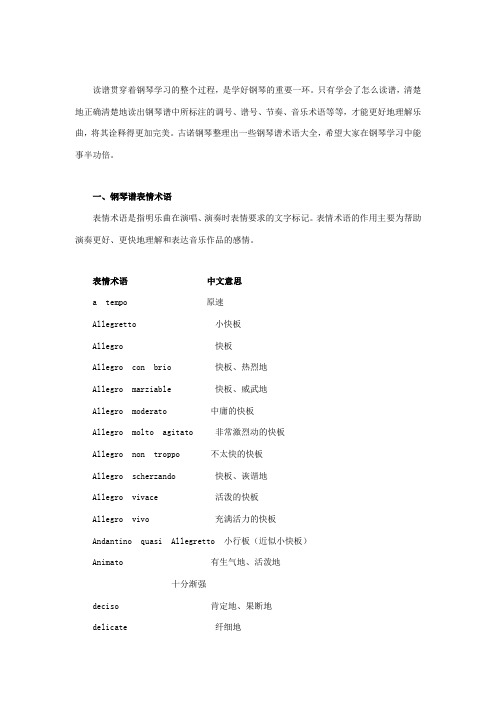
读谱贯穿着钢琴学习的整个过程,是学好钢琴的重要一环。
只有学会了怎么读谱,清楚地正确清楚地读出钢琴谱中所标注的调号、谱号、节奏、音乐术语等等,才能更好地理解乐曲,将其诠释得更加完美。
古诺钢琴整理出一些钢琴谱术语大全,希望大家在钢琴学习中能事半功倍。
一、钢琴谱表情术语表情术语是指明乐曲在演唱、演奏时表情要求的文字标记。
表情术语的作用主要为帮助演奏更好、更快地理解和表达音乐作品的感情。
表情术语中文意思a tempo 原速Allegretto 小快板Allegro 快板Allegro con brio 快板、热烈地Allegro marziable 快板、威武地Allegro moderato 中庸的快板Allegro molto agitato 非常激烈动的快板Allegro non troppo 不太快的快板Allegro scherzando 快板、诙谐地Allegro vivace 活泼的快板Allegro vivo 充满活力的快板Andantino quasi Allegretto 小行板(近似小快板)Animato 有生气地、活泼地十分渐强deciso 肯定地、果断地delicate 纤细地dolce cantabile 柔和如歌dolce lusingando 柔和亲切地dolente 悲伤地D . C . al Fine(Da capo al Fine)从头再奏一次,到fine结束espressivo 有表情地grazioso 优雅地in tempo 原速m.g(main gauche)用左手弹m.d(main droit)用右手弹misterioso 神秘地Moderato 中速Molto agitato, quasi presto 很迫切、近似急板Molto legato e leggiero 非常连贯、轻快mormoando 喃喃细语地Movement de Valse 圆舞曲速度perdendosi 渐渐消失ped. simile 同样的踏板piu lento 再慢地presto 急板Rall (rallentando)减慢religioso 宗教般虔诚、庄严地risoluto 果断地Riten(ritenuto)渐慢subito 突然、立刻sempre con ped 继续用踏板senza ped 不用踏板ten.(tenuto)保持充分时值un poco agitato 稍激动地allamarcia 进行曲风格allargando 渐慢并渐强appassionate 热情地agitato 激动地animato 生气勃勃地brillante 辉煌地brioso 充满活力地comodo 自在地con fuoco 火热地calm 平静地cantabile 如歌地con spirito 有精神地deciso 坚定地doice 柔和地dolente 怨诉地energico 精力充沛地fantastico 幻想地grave 沉重地grazioso 优雅地giocoso 嬉戏地leggiero 轻巧地largamente 宽广地maestoso 庄严地mesto 忧伤地nobilmente 高雅地pathetic 悲怆地passionate 热情洋溢地pastoral 田园地risoluto 果断地Rubato 节奏自由semplice 朴素地sempre 继续地sentimento 多愁善感地sostenuto 持续地vivace 活泼地vivo 活跃地scherzando 幽默地spirito 精神饱满地tranquillo 安静地二、钢琴谱速度术语音乐进行的快慢称为速度,速度记号用来标明乐曲在进行中快慢。
POCO文档翻译:POCOC++库入门指南

POCO⽂档翻译:POCOC++库⼊门指南内容⽬录介绍POCO C++库是⼀组开源C++类库的集合,它们简化及加速了⽤C++来开发以⽹络功能为核⼼的可移植程序的过程。
这些库,完美地与C++标准库结合到⼀起,并且填补了它所留下的那些空缺。
它们具有模块化、⾼效的设计与实现,使得POCO C++库特别适合于进⾏嵌⼊式开发。
⽽这是C++编程语⾔正在变得越来越流⾏的领域,因为,它既能进⾏底层(设备I/O、中断处理,等等)的开发,也能进⾏⾼级的⾯向对象的开发。
当然,POCO也已经准备好⾯对企业级开发的挑战了。
POCO由4个核⼼库及若⼲个附加库组成。
核⼼库是:Foundation、XML、Util和Net。
其中的两个附加库是:NetSSL,为Net 库中的⽹络类提供SSL ⽀持;Data,⽤来以统⼀的形式访问不同的SQL 数据库。
POCO致⼒于进⾏以⽹络功能为核⼼的跨平台C++软件的开发,可以类⽐于Ruby on Rails对于Web开发的作⽤——⼀个功能强⼤⽽⼜简单易⽤的平台,⽤来构建妳⾃⼰的应⽤程序。
POCO是严格围绕标准ANSI/ISO C++来开发的,并且⽀持标准库。
贡献者们努⼒地达到以下要素之间的平衡:使⽤⾼级的C++特性;保持那些类的可理解性;保持代码的⼲净、⼀致及易维护性。
Foundation库POCO提供了⼀些类,⽤于处理多种变种中的⽇期及时间。
对于⽂件系统访问功能, POCO提供了和类,以及类。
在狠多程序中,某个部分需要向其它部分告知某些事件发⽣了。
POCO提供了、和事件 (类似于 C#事件) 来简化这个过程。
以下⽰例展⽰了 POCO事件的⽤法。
在这个⽰例中,类 Source 拥有⼀个公有事件,名为 theEvent ,它有⼀个参数,类型为 int 。
订阅者可以通过调⽤ operator +=来订阅,调⽤ operator -= 来取消订阅,并且要传⼊两个参数:指向某个对象的⼀个指针;以及,指向某个成员函数的指针。
钢琴入门:钢琴谱术语大全
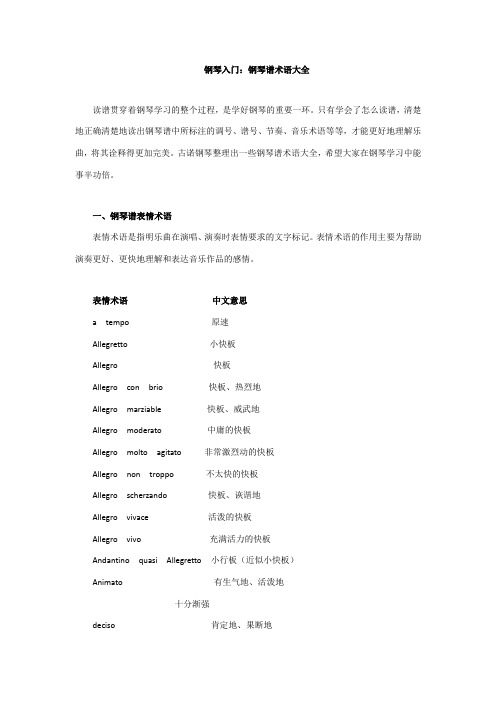
钢琴入门:钢琴谱术语大全读谱贯穿着钢琴学习的整个过程,是学好钢琴的重要一环。
只有学会了怎么读谱,清楚地正确清楚地读出钢琴谱中所标注的调号、谱号、节奏、音乐术语等等,才能更好地理解乐曲,将其诠释得更加完美。
古诺钢琴整理出一些钢琴谱术语大全,希望大家在钢琴学习中能事半功倍。
一、钢琴谱表情术语表情术语是指明乐曲在演唱、演奏时表情要求的文字标记。
表情术语的作用主要为帮助演奏更好、更快地理解和表达音乐作品的感情。
表情术语中文意思a tempo 原速Allegretto 小快板Allegro 快板Allegro con brio 快板、热烈地Allegro marziable 快板、威武地Allegro moderato 中庸的快板Allegro molto agitato 非常激烈动的快板Allegro non troppo 不太快的快板Allegro scherzando 快板、诙谐地Allegro vivace 活泼的快板Allegro vivo 充满活力的快板Andantino quasi Allegretto 小行板(近似小快板)Animato 有生气地、活泼地十分渐强deciso 肯定地、果断地delicate 纤细地dolce cantabile 柔和如歌dolce lusingando 柔和亲切地dolente 悲伤地D . C . al Fine(Da capo al Fine)从头再奏一次,到fine结束espressivo 有表情地grazioso 优雅地in tempo 原速m.g(main gauche)用左手弹m.d(main droit)用右手弹misterioso 神秘地Moderato 中速Molto agitato,quasi presto 很迫切、近似急板Molto legato e leggiero 非常连贯、轻快mormoando 喃喃细语地Movement de Valse 圆舞曲速度perdendosi 渐渐消失ped. simile 同样的踏板piu lento 再慢地presto 急板Rall (rallentando)减慢religioso 宗教般虔诚、庄严地risoluto 果断地Riten(ritenuto)渐慢subito 突然、立刻sempre con ped 继续用踏板senza ped 不用踏板ten.(tenuto)保持充分时值un poco agitato 稍激动地allamarcia 进行曲风格allargando 渐慢并渐强appassionate 热情地agitato 激动地animato 生气勃勃地brillante 辉煌地brioso 充满活力地comodo 自在地con fuoco 火热地calm 平静地cantabile 如歌地con spirito 有精神地deciso 坚定地doice 柔和地dolente 怨诉地energico 精力充沛地fantastico 幻想地grave 沉重地grazioso 优雅地giocoso 嬉戏地leggiero 轻巧地largamente 宽广地maestoso 庄严地marcato 强调mesto 忧伤地nobilmente 高雅地pathetic 悲怆地passionate 热情洋溢地pastoral 田园地risoluto 果断地Rubato 节奏自由semplice 朴素地sempre 继续地sentimento 多愁善感地sostenuto 持续地vivace 活泼地vivo 活跃地scherzando 幽默地spirito 精神饱满地tranquillo 安静地二、钢琴谱速度术语音乐进行的快慢称为速度,速度记号用来标明乐曲在进行中快慢。
Poco rit音乐术语
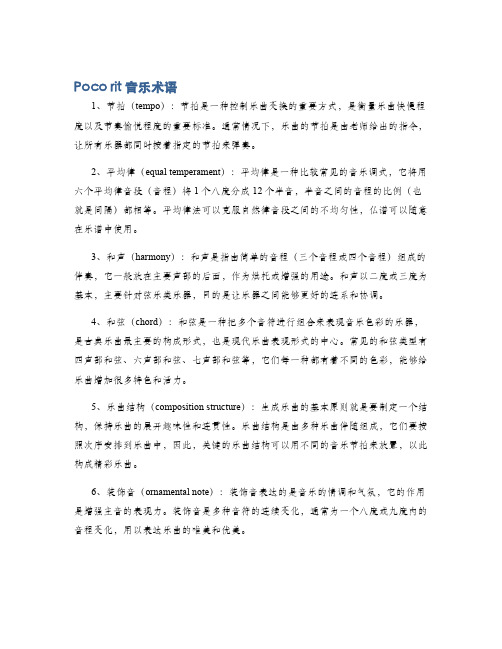
Poco rit音乐术语1、节拍(tempo):节拍是一种控制乐曲变换的重要方式,是衡量乐曲快慢程度以及节奏愉悦程度的重要标准。
通常情况下,乐曲的节拍是由老师给出的指令,让所有乐器都同时按着指定的节拍来弹奏。
2、平均律(equal temperament):平均律是一种比较常见的音乐调式,它将用六个平均律音段(音程)将1个八度分成12个半音,半音之间的音程的比例(也就是间隔)都相等。
平均律法可以克服自然律音段之间的不均匀性,仏谱可以随意在乐谱中使用。
3、和声(harmony):和声是指由简单的音程(三个音程或四个音程)组成的伴奏,它一般放在主要声部的后面,作为烘托或增强的用途。
和声以二度或三度为基本,主要针对弦乐类乐器,目的是让乐器之间能够更好的连系和协调。
4、和弦(chord):和弦是一种把多个音符进行组合来表现音乐色彩的乐器,是古典乐曲最主要的构成形式,也是现代乐曲表现形式的中心。
常见的和弦类型有四声部和弦、六声部和弦、七声部和弦等,它们每一种都有着不同的色彩,能够给乐曲增加很多特色和活力。
5、乐曲结构(composition structure):生成乐曲的基本原则就是要制定一个结构,保持乐曲的展开趣味性和连贯性。
乐曲结构是由多种乐曲伴随组成,它们要按照次序安排到乐曲中,因此,关键的乐曲结构可以用不同的音乐节拍来放置,以此构成精彩乐曲。
6、装饰音(ornamental note):装饰音表达的是音乐的情调和气氛,它的作用是增强主音的表现力。
装饰音是多种音符的连续变化,通常为一个八度或九度内的音程变化,用以表达乐曲的唯美和优美。
7、加音(added note):加音是在一种音程中添加一个小型音程,这样就能使乐曲中的音程变得更加丰富和复杂,充满变化。
加音可以根据不同的型号和音乐基调,添加不同的音程类型,例如三度或七度音程,以增加乐曲的色彩。
- 1、下载文档前请自行甄别文档内容的完整性,平台不提供额外的编辑、内容补充、找答案等附加服务。
- 2、"仅部分预览"的文档,不可在线预览部分如存在完整性等问题,可反馈申请退款(可完整预览的文档不适用该条件!)。
- 3、如文档侵犯您的权益,请联系客服反馈,我们会尽快为您处理(人工客服工作时间:9:00-18:30)。
Poco入门介绍1.Poco库简介官方网站: /index.htmlPOCO C++库是开源的用于简化和加速C++开发面向网络、可移植应用程序的C++库集,POCO库和C++标准库可以很好的集成并填补了C++标准库缺乏的功能空隙。
POCO库的模块化、高效的设计及实现使得POCO特别适合嵌入式开发。
核心库是: Foundation, XML, Util 和 Net. 附加库中其中2个是NetSSL和Data,NetSSL 为Net库中的网络类提供SSL支持, Data库提供访问不同SQL数据库的一致性接口支持的平台:Microsoft WindowsLinuxMac OS XHP-UX,Solaris,AIX*Embedded Linux(UcLibc,glibc)iOSWinodows Embedded CEQNX2.常用功能点> Any and DynamicAny classes> Cache framework> Cryptography (cryptographic hashes, encryption based on OpenSSL)> Date and Time classes> Events (signal/slot mechanism) and notifications framework> FTP client for transferring files> Filesystem classes for platform-independent path manipulation,directory listing and globing > HTML form handling> HTTP server and client (also secure), C++ Server Page Compiler> Logging framework> Multithreading: basic threads and synchronization and advanced facilities (thread pool, active objects, work queues, etc.)> POP3 client for receiving mail> Platform Abstraction: write once, compile and run on multiple platforms> Processes and IPC> Reactor framework> Regular expressions (based on PCRE)> SMTP client for sending mail> SQL database access (SQLite, MySQL, ODBC)> SSL/TLS support based on OpenSSL> Shared library and class loading>Smart pointers and memory management (buffer, pool)> Sockets and raw sockets> Stream classes for Base64 and HexBinary encoding/decoding, compression (zlib), line ending conversion, reading/writing tomemory, etc> String formatting and string utilities> TCP server framework (multithreaded)> Text encodings and conversions> Tuples> URI handling> UTF-8 and Unicode support> UUID handling and generation> XML parsing (SAX2 and DOM) and XML generation> Zip file manipulation2.编译安装2.1 windows下的编译安装2.1.1 Visual Studio 2008 下的编译安装---省略演示2.1.2 Eclipse 下的编译安装---演示为主1.安装MinGW+msys cygwin2.安装eclipse3.设置eclipse编译工具链2.2 unix/linux平台下的编译安装主要步骤如下:1.2.3.HelloWorld 开发自己的第一个应用3.1构建自己的工程a.创建工程目录hellWorldb.创建目录include src 目录helloWorld/include/srcMakefilec. 创建hellWorld.cpp文件3.2编写Makefile警告:Objects,target,target_version,target_libs变量最末尾一定不能有空格,否则编译会出现异常3.3 编译Gmake shared_release3.4 运行3.5 调试4.核心模块介绍4.1.跨平台编译包编译脚本目录$POCO_BASE/build常见的修改:POCO_BASE 定义poco代码目录OSARCH_64BITS =1 定义64位编译模式SRCDIR = src makefile与.cpp的位置INCDIR = include .h文件夹LIBDIR = lib lib文件夹BINDIR = bin bin文件夹OBJDIR = obj/$(OSNAME)/$(OSARCH)DEPDIR = .dep/$(OSNAME)/$(OSARCH)LIBPATH = $(POCO_BUILD)/$(LIBDIR)BINPATH = $(POCO_BUILD)/$(COMPONENT)/$(BINDIR) -->建议改为$(BINDIR)OBJPATH = $(POCO_BUILD)/$(COMPONENT)/$(OBJDIR)-->可以不用管)$(OBJDIR)DEPPATH = $(POCO_BUILD)/$(COMPONENT)/$(DEPDIR)-->依赖文件目录)$(DEPDIR)系统自带的编译指令:all: $(DEFAULT_TARGET)all_static: static_debug static_releaseall_shared: shared_debug shared_releaseall_debug: static_debug shared_debugall_release: static_release shared_release自定义编译指令:CFLAGS += -gCXXFLAGS += -gPOCO_FLAGS +=COMMONFLAGS = -DPOCO_BUILD_HOST=$(HOSTNAME) $(POCO_FLAGS)添加额外的头文件路径:POCO_ADD_INCLUDE += $(ORACLE_HOME)/precomp/public $(ORACLE_HOME)/rdbms/public $(ORACLE_HOME)/rdbms/demoPOCO_ADD_LIBRARY +=$(ORACLE_HOME)/$(OraLib)添加额外的链接库非POCO编译出来的库SYSLIBS +=-locci -lclntsh编译方式:gmake shared_releasegmake shared_debuggmake static_releasegmake static_debuggmake all_releasegmake all_debuggmake all4.2.Foundation库4.2.1 core 模块a.Platform abstraction1.统一了各个平台的数据类型比如long ,int ,long long 等,参考types.h2.平台的big-endian和little-endian 参考ByteOrder.h3.平台类型相关信息platform.hb. Memory Management1.智能指针(smart pointer)和共享指针(shared pointer) 参考AutoPtr.h,SharedPtr.h2.据以引用计数器的垃圾回收机制AtomicCounter.h,refCountedObject.h3.单件类(singleton objects) SingletonHolder.hc.String Utilities字符串的比较(大小写转换,大小写无关转换,去除空白符号,字符转换和连接,分拆),参考String.h,StringTokenizer.hd.Error Handling1. 断言类,类似assert,主要使用宏断言,比如poco_asert(myPtr);参考Bugcheck.h2.异常类, 了解Poco::exception结构,使用POCO_DECLARE_EXCEPTION宏,参考Exception.h4.2.2.streamspass4.2.3.Threadingpass4.2.4.DateTimea.Timestamp 微秒级精度,对gettimeofday()封装,参考Timestamp.hb.Stopwatch 计时器,参考Stopwatch.hc.DateTime 日历时间,参考DateTime.hd.日历时间的格式转换DateTimeFormat,DateTimeFormatter,DateTimeParser 等e.日历时区Timezonef.本地时间LocalDateTime4.2.5 FileSystem与平台无关的文件,目录的操作类。
a.File类,读取文件的相关信息,比如权限,大小,日期,文件的删除,拷贝等b.Path 类,文件目录的解析,目录创建等c.DirectoryIterator类,遍历指定目录下的文件列表d.TemporaryFile 类,临时文件创建,删除等4.2.6 Logging可以输出到多个目的地(console,log files,Unix Syslog,Windows Event Log,remote logging)主要是定义日志文件格式logging.loggers.root.channel.class = ConsoleChannel = globallogging.loggers.app.channel.class =SplitterChannellogging.loggers.app.channel.channels=c1,logfile#日志global.testApp=global.testApp#logging.loggers.mylogger.channel=file2logging.filename=${logging.dir}\\${}.log#定义日志格式logging.formatters.formatter1.class = PatternFormatterlogging.formatters.formatter1.times=locallogging.formatters.formatter1.pattern =[%y/%m/%d %H:%M:%S][${application.month}][%q]-%t#定义日志输出地,输出地名称输出的格式logging.channels.c1.class = ConsoleChannellogging.channels.c1.formatter =formatter1logging.channels.logfile.class=FileChannellogging.channels.logfile.times=locallogging.channels.logfile.formatter=formatter1logging.channels.logfile.path=${system.env.HOME}/Download/${application.n ame}_${application.month}.log#rotationlogging.channels.logfile.rotation=daily#file2logging.channels.file2.class=FileChannellogging.channels.file2.times=local#archive number|timestamplogging.channels.file2.archive=numberlogging.channels.file2.class=FileChannellogging.channels.file2.formatter=formatter1logging.channels.file2.path=${}_${application.month}_a.log logging.channels.file2.rotation=dailypress=true#purge purgeAge|purgeCountlogging.loggers.root.level = debuglogging.loggers.root.channel.class = SplitterChannel///以channel开头的属性logging.loggers.root.channel.channel1 = consoleChannellogging.loggers.root.channel.channel2 = fileChannel也可以配置成logging.loggers.root.channel.channels=consoleChannel,fileChannel///定义控制台通道logging.channels.consoleChannel.class = ConsoleChannellogging.channels.consoleChannel.formatter = f1///定义文件通道logging.channels.fileChannel.class = FileChannellogging.channels.fileChannel.path = mantid.loglogging.channels.fileChannel.formatter.class = PatternFormatter\n" logging.channels.fileChannel.formatter.pattern= %Y-%m-%d %H:%M:%S,%i [%I] %p %s - %t///定义消息格式logging.formatters.f1.class = PatternFormatterlogging.formatters.f1.pattern = %s-[%p] %t4.2.7 Processes4.2.8 Shared Libraries4.2.9 Notifications4.2.10 Event4.2.11 Crypt4.2.12 Text4.2.13 Regular Expressions4.3.XML库Xml解析器是对expat解析库的包装。
